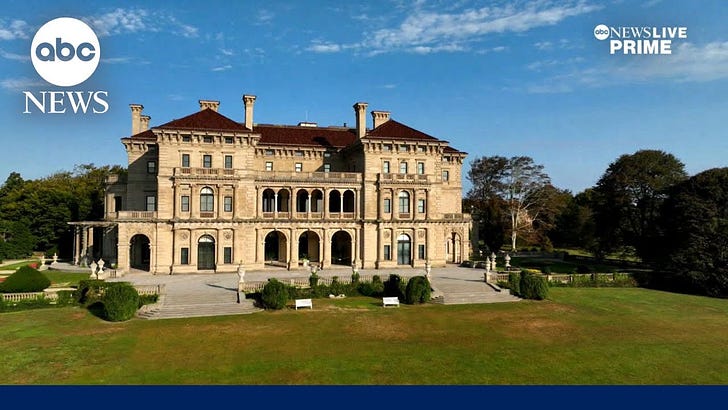Reflections on 'Titan', the Definitive Biography of John D. Rockefeller
As we consider a new Gilded Age
I have just finished the fascinating, definitive 1998 biography by Ron Chernow, Titan: The Life of John D. Rockefeller Sr, the richest man on the planet before the enactment of the progressive income tax in 1913, and many regulatory reforms since then. And one of the world’s greatest philanthropists, who redeemed his image by giving away lots of his money, though not so much as to leave his family in need of making their own way in the world. Four generations later, the Rockefellers are still one of the richest families in the world.
What I most enjoyed was the book’s generational sweep, with evocative profiles of not only John D.’s snake oil salesman father; but the complex psychology of the founder — not just a craven, self-centered robber-baron but a man of frugality and very disciplined religious and charitable instincts — but his children and grandchildren as well, and the impact of vast wealth on them. So it’s a biography of four generations. Two more generations of the family have distinguished themselves in philanthropy and politics since then.
I especially enjoyed the psychological descriptions of the family members, like characters in a novel, that you could relate to because they remind you of “ordinary” people you know.
John D. Rockefeller Jr, shaken by his father’s rigid compartmentalization — ruthlessness and depravity in business, while showing such kindness, gentleness, and generosity in private — was determined to redeem the family image with philanthropic largess.
The chapter on Senior’s daughter Edith Rockefeller McCormick (1872-1932) was particularly fascinating, especially her fondness for Jungian psychology and its founder Carl Jung.
John D. Rockefeller III (Wikipedia) (the father of WV Senator Jay) had an inferiority complex. His diary frequently listed and dwelled on his faults.
Nelson Rockefeller was “heedless of the inhibitions that ruled their parents’ lives… his brash exuberance sapped his brother’s confidence further….(He had) a flamboyant craving for publicity, a cheerful egotism…(he was) fun-loving, narcissistic…(his) cocky antics, frank and outspoken nature…(he was) clearly favored by his mother.
At Dartmouth, he was popular. “A star in sackcloth…” With his worn corduroy pants and sagging sweaters, he tried to blend in with the crowd…college president was a pal…did not drink, taught Sunday school class, drank PBR, rode a bike….Wanted to vindicate his grandfather and Standard Oil.
Nelson’s wife Mary Tod “was self-contained,” making their marriage lonely, an explanation perhaps for Rocky stepping out on her with his secretary Happy (though he stepped out on her as well).
Nelson's brother David became an investment banker and lived until 101. His daughter Abby, born in 1943, is a radical feminist and a Marxist.
It made me wonder as a family historian of sorts if I could write even a paragraph about the psychological makeup of my ancestors who lived during the same period as John D. (1839-1937), much less his father William (1810-1906).
Certainly, Calvinism played a role in the psychological make-up of John D. Sr and his son John D. Jr (1874-1960). Senior evolved from a Baptist fundamentalist in his youth to a more ecumenical believer in old age, though still narrow in religious beliefs compared to his children and grandchildren. Certainly, his charitable instincts were admirable, and he and his son John D. Jr. redeemed themselves from the horrors of the Ludlow Massacre and other ruthless business practices.
I do wonder if the extraordinarily wealthy today — the Elon Musks, the Steve Jobs, the Jeff Bezos, the Donald Trumps — have a fraction of the charitable impulses of the Rockefellers or other powerful families of the 19th or early 20th century. Without religious convictions, they seem to have fewer redeeming qualities than the Rockefellers, who at least built a charitable monument to good works. Bill Gates and his ex-wife Melinda are at least trying.
Follow this link to Goodreads for a summary of this highly recommended biography, along with reader comments and quotes from the book. The audiobook is easy to listen to in the car, on walks, or while exercising.
The Rockefellers: How They Became Rich, Powerful and Cut Off From the Larger World
On Youtube, posted by Jon Scobie, 2011:
How did John D. Rockefeller (1839-1937) become the wealthiest American of all time and the richest person in modern history? The Rockefellers “feared the temptations of wealth, yet a visitor once described their estate as ‘the kind of place God would have built, if only he’d had the money.’ They amassed a fortune that out-riched America, then gave it away, reshaping America. They were the closest thing the country had to a royal family, but the Rockefellers shunned the public eye, retreating behind the walls of their palatial home” in New York. This is their story.
Woody Guthrie Sings About the Ludlow Massacre
This refers to the violent deaths of 20 people, 11 of them children, during an attack by the Colorado National Guard on a tent colony of 1,200 striking coal miners and their families in Ludlow, Colorado on April 20, 1914. Learn more about the Ludlow Massacre from Wikipedia and from YouTube.





I have been reflecting on your idea that now that religion is not a part of a lot of people's lives how does that affect monetary giving, and I think it probably does lessen dollars given. However, there are some people who are simply generous and give from their sense of the common good of humankind. Thanks for the great review.
Dear Kat, I agree. Religious belief is no guarantee of generosity, financial or otherwise. John D. Rockefeller seemed compelled, psychologically, to distinguish himself from his father by leading an exemplary life religiously and philanthropically. His father claimed to be a doctor (he wasn't) and cheated sick people with fake cures and fake medications, and abandoned his wife and children to take up with another woman, and wander small towns under an assumed name cheating people. John considered his deeply religious, long-suffering mother a saint. It's hard to know whether he was motivated by shame or the desire to redeem the family name from what his father did and from his own ruthless business practices, which he never admitted to.